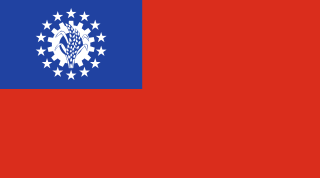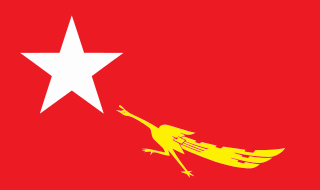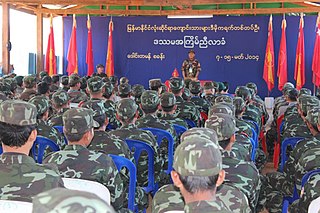
Myanmar is a unitary parliamentary republic under its constitution of 2008. The Economist Intelligence Unit has rated Myanmar as "hybrid regime" in 2016. The military of Burma holds a large amount of power in the government, despite the end of the last Burmese military dictatorship.

Historically strained, Myanmar's foreign relations, particularly with Western nations, have improved since 2012. Relations became strained once more in 2017 with the Rohingya crisis. Myanmar has generally maintained warmer relations with neighbouring states and is a member of the Association of Southeast Asian Nations.

Senior General Than Shwe is a Burmese strongman politician who was the head of state of Burma from 1992 to 2011 as Chairman of the State Peace and Development Council (SPDC). During this period, he held key positions of power including Prime Minister of Burma, Commander-in-chief of Myanmar Defense Services and head of the Union Solidarity and Development Association. In March 2011 he officially stepped down as head of state in favour of his hand-picked successor, Thein Sein, and as head of the Armed Forces, being replaced by general Min Aung Hlaing.
The history of Myanmar covers the period from the time of first-known human settlements 13,000 years ago to the present day. The earliest inhabitants of recorded history were a Tibeto-Burman-speaking people who established the Pyu city-states ranged as far south as Pyay and adopted Theravada Buddhism.

Human rights in Myanmar under its military regime have long been regarded as among the worst in the world. International human rights organisations including Human Rights Watch, Amnesty International, and the American Association for the Advancement of Science have repeatedly documented and condemned widespread human rights violations in Myanmar. The Freedom in the World 2011 report by Freedom House notes that "The military junta has... suppressed nearly all basic rights; and committed human rights abuses with impunity." In 2011 the "country's more than 2,100 political prisoners included about 429 members of the NLD, the victors in the 1990 elections." As of July 2013, according to the Assistance Association for Political Prisoners, there were about 100 political prisoners in Burmese prisons.

The State Peace and Development Council was the official name of the military government of Burma, which seized power under the rule of Saw Maung in 1988. On 30 March 2011, Senior General and Council Chairman Than Shwe signed a decree that officially dissolved the Council.

University of Yangon, located in Kamayut, Yangon, is the oldest university in Myanmar's modern education system and the best known university in Myanmar. The university offers mainly undergraduate and postgraduate degrees programs in liberal arts, sciences and law. Full-time bachelor's degrees were not offered at the university's main campus after the student protests of 1996. The bachelor's degree was re-offered from 2014 on, to the best students in the country. Today degrees in Political Science are offered to undergraduate students, as well as Postgraduate diplomas in areas such as social work and geology.

The National Coalition Government of the Union of Burma was an administration claimed to be the government in exile of Burma (Myanmar). It had its headquarters in Rockville, Maryland, United States. It was formally established in December 1990, with Sein Win as its first prime minister. It was dissolved in September 2012.

The Irrawaddy is a website by the Irrawaddy Publishing Group (IPG), founded in 1990 by Burmese exiles living in Thailand. From its inception, The Irrawaddy has taken an independent stance on Burmese politics. As a publication produced by former Burmese activists who fled violent crackdowns on anti-military protests in 1988, it has always been closely associated with the pro-democracy movement, although it remains unaffiliated with any of the political groups that have emerged since the 8888 Uprising.

The 8888 Nationwide Popular Pro-Democracy Protests, also known as the 8-8-88 Uprisings, or the People Power Uprising, the People's Democracy Movement and the 1988 Uprising, were a series of nationwide protests, marches and civil unrest in Burma (Myanmar) that peaked in August 1988. Key events occurred on 8 August 1988 and therefore it is known as the 8888 Uprising. The protests began as a student movement and were organised largely by university students at the Rangoon Arts and Sciences University and the Rangoon Institute of Technology (RIT).
Sein Lwin was a Burmese politician and retired military general in the Myanmar Army. He was served as President of Myanmar for 17 days in 1988, following the resignation of San Yu.
Human Rights Defenders and Promoters was formed in 2002 in Burma to raise awareness among the people of Burma about their human rights and help them conduct advocacy.
Ka Hsaw Wa is a Burmese human rights activist. He is a member of the Karen indigenous group. Along with his wife, environmental and human rights attorney Katie Redford, he is the co-founder and co-director of EarthRights International (ERI), an organization that focuses on human rights in Burma and other areas "where protection of human rights and the environment is intrinsically connected." Ka Hsaw Wa and Katie Redford have two young children.

The political relationship between the United States and Myanmar worsened after the 1988 military coup and violent suppression of pro-democracy demonstrations. Subsequent repression, including the crackdown on peaceful protestors in September 2007, further strained the relationship. However, following signs of liberalization, the US government began the process of improving its links with Myanmar in 2011. With improving ties in 2012, the White House planned Ambassador nomination, the first since 1990. On June 29, 2012, the U.S. Senate confirmed Derek Mitchell as the United States Ambassador to Myanmar.

The All Burma Students' Democratic Front is an opposition group in Myanmar. It was founded on 1 November 1988, after the 8888 protests in Yangon. The group's leadership consists mostly of former student exiles.
The All Burma Federation of Student Unions (ABFSU) is the umbrella organisation for all the student unions in Burma and is an active voice for academic freedoms and student rights throughout the country. ABFSU offers a reliable source of information to the outside world, reporting regularly on the attempts of the military government (SPDC) to intimidate and silence those involved in the pro-democracy movement.

Khin Ohmar is a Burmese democracy activist noted for her leadership in the 8888 Uprising and her work with the Women's League of Burma and the Burma Partnership.

Nay Win Maung was a Burmese physician, businessman and pro-democracy activist. Maung advocated a conciliatory approach toward Myanmar's ruling military junta, which seized power in 1988. Maung argued that Burma could be moved towards democratization by working directly with the country's generals, rather than confronting them. Maung sometimes took political positions which proved controversial among Burma's opposition leaders, who often viewed his ties to the military government with suspicion. He stated that Aung San Suu Kyi should accept a new constitution written by the military as a token of goodwill. He believed that Aung San Suu Kyi's National League for Democracy (NLD) should only contest half the parliamentary seats in the 2010 general election, arguing that a landslide win for the NLD would scare the Burmese rulers into holding onto power. However, Maung heavily criticized the generals for rigging the 2010 general election when the extent of voter fraud became known..

The 1962 Rangoon University protests were a series of marches, demonstrations, and protests against stricter campus regulations, the end of the system of university self-administration, and the policy of the new military regime of General Ne Win. The main events took place in Rangoon, Burma (Myanmar) on 7–8 July 1962. On 7 July 1962, the military regime violently suppressed a student demonstration at Rangoon University attended by some 2,000 students. This resulted in the deaths of more than one hundred, and the arrest of more than 3,000 students according to unofficial but reliable sources. However, official government statements put the death toll at 15. In the morning hours of the next day, the military regime blew up the historic Rangoon University Students' Union (RUSU) building, which had been the symbol of the anti-colonial nationalism struggle since the 1920s.
Aung Zaw,, is a Burmese journalist, editor, and founder of major publishing media The Irrawaddy. He was jailed and tortured at the age of 20, then covertly escaped his home country after he began protesting the governments socialist military regime during the 8888 Uprising. His news magazine reported on event later during the Saffron Revolution.













